|
|
|
Sort Order |
|
|
|
Items / Page
|
|
|
|
|
|
|
| Srl | Item |
| 1 |
ID:
177998
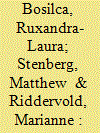

|
|
|
|
|
| Summary/Abstract |
Why did the European Union (EU) launch a naval operation in response to the migration crisis, despite the humanitarian character of the challenge at hand, doubts about the effectiveness of a military response, and the EU’s traditional focus on civilian means? Integrating institutionalist theory and the literature on crisis response, this article argues that EUNAVFOR MED Operation Sophia is an example of copying through contingent learning wherein the EU’s response to the migration crisis was shaped by naval missions Operation Mare Nostrum and Operation Atalanta. While the former set a precedent for a naval response to migration in the Mediterranean, the latter provided an off-the-shelf institutional blueprint for the design and implementation of Operation Sophia. In a crisis situation characterised by high uncertainty, and with little time to rethink policies or to create new structures, EU political actors used contingent learning to quickly evaluate potential policy responses and institutional reforms, leading them to the decision to copy past institutional designs and practices previously considered successful. This finding has relevance beyond the case of Operation Sophia, as it contributes to a better understanding of why a particular type of policy or action is chosen in times of crisis and urgency.
|
|
|
|
|
|
|
|
|
|
|
|
|
|
|
|
| 2 |
ID:
177999


|
|
|
|
|
| Summary/Abstract |
In February 2020, French president Emmanuel Macron invited all interested European states to a “strategic dialogue” on the supposed contribution of France’s nuclear arsenal to European collective security. While certain media commentators relayed Macron’s intervention with approbation and excitement, framing the proposal as an exciting new idea that, if implemented, might boost Europe’s clout on the world stage, the dominant reaction was one of ennui. After all, the argument for Euro-nukes is far from new. In fact, several (mostly French) actors have unsuccessfully attempted to persuade European policymakers of the necessity of European nuclear weapons cooperation for more than half a century. In this article, we investigate the history, merits, and longevity of the case for European nuclear arms. Drawing on secondary literature, policymakers’ writings, and two hitherto untapped surveys of European public opinion conducted by one of the authors, we argue that the case for Euro-nukes is critically flawed with respect to security, strategic autonomy, futurity, and democratic good governance. We maintain that the continuous resurfacing of the “zombie” case for Euro-nukes is made possible by powerful organisational interests, as well as conceptual reversification resulting in enduring contradictions between nuclear vulnerabilities and claims of protection and autonomy.
|
|
|
|
|
|
|
|
|
|
|
|
|
|
|
|
| 3 |
ID:
177997


|
|
|
|
|
| Summary/Abstract |
We investigate external and domestic political influences on defence burden of the 28 EU member states, based on time-series cross-section data from 1993 to 2017. Our research is one of the most comprehensive studies on EU members' defence, as it includes many potential explanations. Our findings do not support freeriding by EU members, both NATO allies and non-NATO members, on US commitment in the defence and security field. Relatedly, NATO membership does not come up in the analysis as an instantaneous guarantee for an effective special relationship with the US. However, there is evidence of freeriding by EU members not belonging to the Alliance on EU-NATO member states. Domestic political factors are also important: right-wing parties in government are associated with heavier defence burden, while upcoming elections tend to reduce it. In general, we find that to provide an accurate explanation of military spending, one needs to take into account a multitude of different factors and, moreover, pay attention to conditional effects.
|
|
|
|
|
|
|
|
|
|
|
|
|
|
|
|
| 4 |
ID:
177995
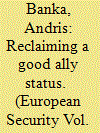

|
|
|
|
|
| Summary/Abstract |
What are the coping strategies of small states at a time when their great power ally questions its security guarantees? Faced with such a scenario, one strand of the literature proposes that small states will seek to establish a reputation of a “good ally” in the eyes of their security patron, thus reducing the likelihood of abandonment. Others, however, maintain that in times of heightened geopolitical uncertainty, small states will attempt to “hedge their bets” by reducing their reliance upon a capricious great power and pursue strategic realignment. The article tests these theoretical assumptions against NATO’s easternmost members: Estonia, Latvia, and Lithuania and their navigation of the “America First” world. The analysis lends evidence that the Baltics have not sought a strategic reorientation away from Washington. Instead, to guard against the possibility of their patron’s defection, they have strived to gain a loyal and trustworthy partner’s reputation by increasing their defence spending and joining the US on a foreign battlefield. The study concludes that these efforts have been primarily geared towards an audience of one: a NATO-sceptic US President.
|
|
|
|
|
|
|
|
|
|
|
|
|
|
|
|
| 5 |
ID:
178002
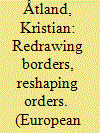

|
|
|
|
|
| Summary/Abstract |
Since Russia’s annexation of Crimea in March 2014, severe limitations have been placed on Ukraine’s coastal state rights and navigational freedoms in the Black and Azov Seas and the Kerch Strait. The “Kerch Strait clash” in November 2018, which resulted in the Russian capture of three Ukrainian naval vessels in international waters south of the strait, can be seen as the temporary culmination of tensions that have been building up over a longer period. In violation of international law and bilateral agreements, Russia has in recent years pursued an increasingly assertive and revisionist policy in the region and sought to turn the maritime spaces on the country’s southwestern flank into a “Russian lake”. This policy is affecting not only the security and economy of neighbouring states such as Ukraine and Georgia, but also the strategic balance in the southeastern corner of Europe. Drawing on empirical evidence derived from Russian, Ukrainian and Western sources, as well as insights from neoclassical realist theory, this article discusses legal, economic and security aspects of Russia’s ongoing quest for a dominant position in the Black Sea region.
|
|
|
|
|
|
|
|
|
|
|
|
|
|
|
|
| 6 |
ID:
178001
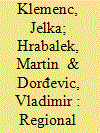

|
|
|
|
|
| Summary/Abstract |
In this article, we offer a fresh look at the Western Balkans by addressing EU external governance with respect to a regional security cooperation perspective as a major EU external governance venue. We analyse how the said cooperation represents a positive example of EU rule transfer by paying attention to the results and to the level of regional ownership in the EU-Western Balkans security engagement. We pay tribute to the existing research on the EU external governance model with respect to regional cooperation and security and build our arguments by extending the said model. The said analysis represents the basis for our claims that the region has transformed from a consumer (of European security) into a security provider. Hence, the Western Balkans has witnessed an EU-induced security framework allowing it to build its capabilities and experience towards finding a more efficient role in the European security system and its governance. We aim to establish a basis for rethinking the concept of the EU-Western Balkans engagement from the Justice and Home Affairs perspective as the core element of what is described in EU strategic documents as EU external governance, outlining a more symmetric relationship between Brussels and the region.
|
|
|
|
|
|
|
|
|
|
|
|
|
|
|
|
| 7 |
ID:
178000
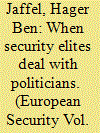

|
|
|
|
|
| Summary/Abstract |
This article examines how security-politics relationships play out in the routines of security elites when confronted with political decisions pertaining to European security cooperation. To do so, the article reflects upon British debates about police and judicial cooperation in a post-Brexit Europe along with debates on the 2014 opt-out from Justice and Home Affairs. How security elites respond to political decisions is investigated from a sociological lens that mobilises lessons from Norbert Elias. The article thus shows how security elites play out distinct roles and conduct distinct types of work when embedded chains of interdependence with professionals of politics that define what legitimate security cooperation is; a neglected aspect in bureaucratic politics and practice turn literature, and Critical Security Studies. It also exposes how security elites fight for EU-led cooperation because of attributes seemingly drawn from lived experiences in EU cooperation and triggered by the constraints of the relationships in which they are situated. The article thus complements existing debates on practices and security professionals by building knowledge on security elites and their routines from the angle of security-politics relationships.
|
|
|
|
|
|
|
|
|
|
|
|
|
|
|
|
| 8 |
ID:
177996
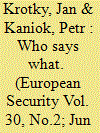

|
|
|
|
|
| Summary/Abstract |
As migration and its securitisation change the political environment in the EU, we examine whether security speech acts (restrictive suggestions) prevail over human security speech acts (a liberal approach) towards irregular migration in the eighth (EU) parliamentary debates and which structural determinants predict delivering one or the other speech act. To achieve this goal, we first conducted a content analysis by which we selected (human) security speech acts; then, a set of binary logistic regressions followed. We explored whether, in the plenary debates, members of the European Parliament propose human security speech acts towards irregular migration rather than security speech acts. Thus, it seems that the attitudes of the members of the European Parliament differ in plenary sessions from the decision-making process. Based on the set of binary logistic regressions, we argue that the left-right division, attitudes toward European integration, and especially the division between the new and old member states are the crucial structural determinants for delivering (human) security speech acts in the plenary speeches.
|
|
|
|
|
|
|
|
|
|
|
|
|
|
|
|
|
|
|
|
|